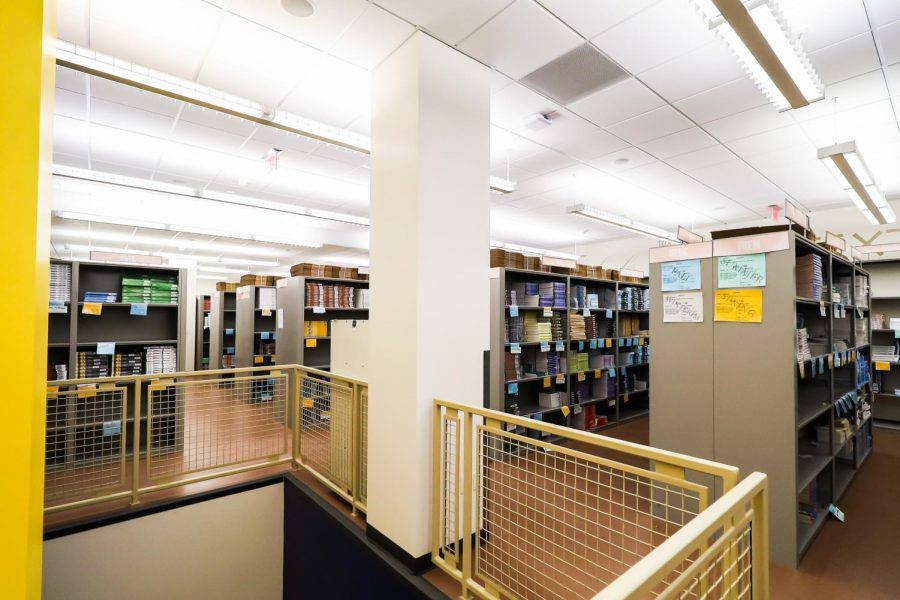UW-Eau Claire pilots program to reduce cost of course materials
Faculty and students report better learning and teaching experience in the process
Photo by Mitch Pettijohn
Miller said OER is something she can continue to use even if the program ends at UW-Eau Claire.
UW-Eau Claire is continuing to pilot a program called Open Educational Resources that helps to reduce the costs of course materials for students.
Fifteen professors have signed on to the OER program, which begins this summer and will be implemented into classes in the fall, Jill Markgraf, the McIntyre Library director, said. It is a way to cut additional costs for students and give them materials they can keep past graduation.
OER consists of learning, teaching and research materials in the public domain that are openly licensed, Markgraf said. They can be anything from textbooks to quizzes and tests.
“People can use them, people can adapt them, save them, distribute them. It’s a shared concept,” Markgraf said.
But UW-Eau Claire is “slow to the game,” Markgraf said, as OER has been a concept used by libraries since the early 2000s. This is because of the textbook rental program’s great effectiveness.
At other schools, Margraf said students pay around $1,200 on average for course materials. The average cost for students is under $400 at UW-Eau Claire, she said.
However, Markgraf said she believes the cost for course materials has always been too high, which is why she is one of the founding members of the program. The idea behind it is to get information into the hands of the people who need it, with the fewest barriers.
“I still see barriers in access to students,” Markgraf said. “As a librarian, I am doing everything I can to provide equal access to resources for students.”
Markgraf said the program looks to target courses that are in high demand, have high enrollment and expensive textbooks or have materials that exist outside of the rental program.
She said the rental program is not going away — OER is just an added bonus.
Jessica Miller, a professor of French at UW-Eau Claire, said she joined the program because she was already looking for OER. Miller said it has helped her be more intentional when instructing and to be less dependent on a textbook.
“When you teach language, you also teach culture, which is constantly changing,” Miller said. “So when you rely on the textbook, you can’t really update the content.”
Miller said she also wanted to increase accessibility to students right at the beginning of the semester. This way she said they are not relying on financial aid to come in before purchasing materials.
Research shows when students don’t have access to materials right away, this negatively impacts their success, Miller said. It makes it hard to catch up and carries over throughout the entire semester, she said.
With OER becoming more widely adopted, Miller said she hopes textbook publishers rethink the role of textbooks in education. Not just in terms of cost, but in content and accessibility.
OER also has drawbacks, Miller said. It is more work than just finding a textbook to fit your course. You have to create your own material if none exists to fit your needs, she said.
“That’s outweighed by the results that I see in students meeting my course outcomes and how I enjoy myself teaching about the topics,” Miller said.
Alanna Cieslewicz, a fourth-year French and communications student, and one of Miller’s students, said the content in her class is much more engaging and relevant for everyone. She said the things she has learned could never be found in a textbook.
Not only that, Cieslewicz said, but it has cut costs for her and is tailored to the instructor’s strengths and weaknesses. She said she would like to see this format in more classes — less for the costs, although it is nice — but more for the better learning experience.
“This format is so much more engaging and it makes it fun to learn,” Cieslewicz said.
Julia Paschke, a first-year international business student and another student of Miller’s, said the cost reduction is a “plus” and enjoys the learning experience way better than her other classes.
Paschke said OER learning feels more inclusive compared to other learning styles. It also makes her feel like putting more effort into assignments, she said.
“I think I would appreciate learning more if I had access to more OER classes,” Paschke said.
Plueger can be reached at pluegemf2903@uwec.edu.

Miles Plueger is a third-year public relations and marketing student. He spent quarantine teaching himself guitar. He also makes a mean chicken stir fry.


